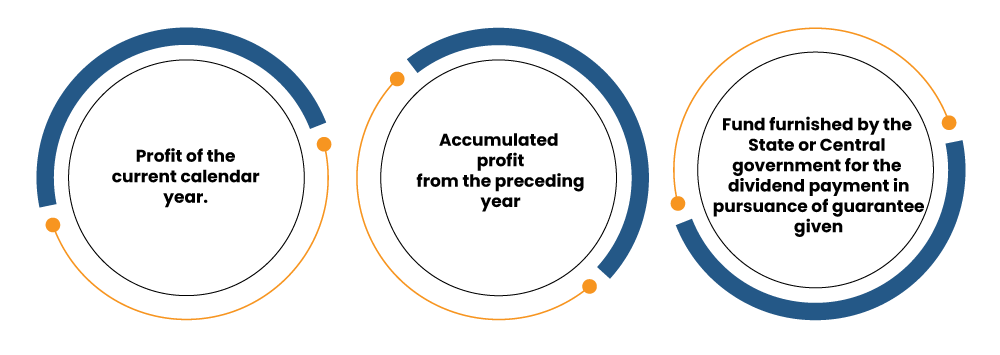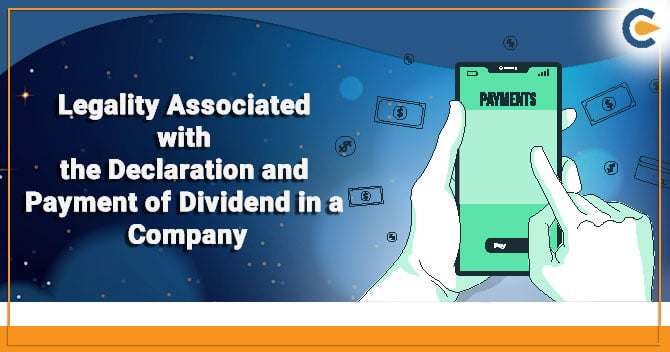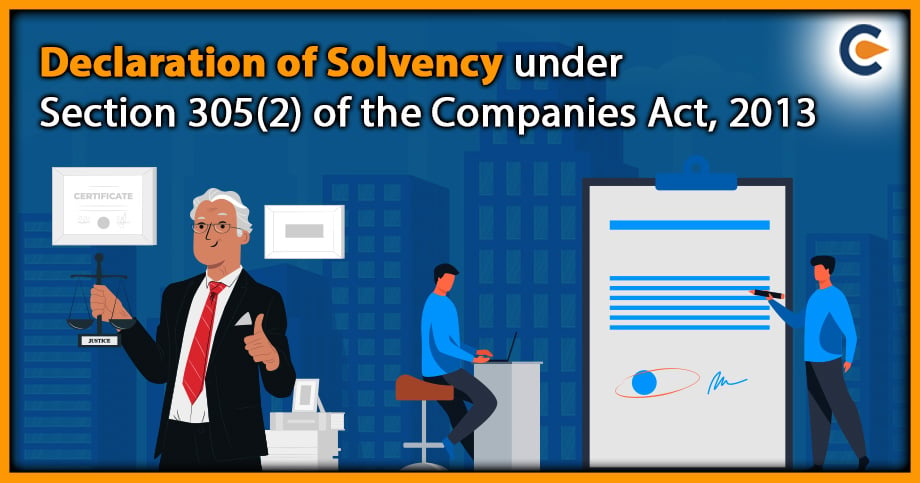The Dividend is basically a profit that is paid to the Company’s shareholders. It is often paid annually to the shareholder after drafting the final accounts of profit, and the same has to be distributed.
Shareholders’ right on profit as dividends only comes up after the declaration of the Dividend made by the Company after getting approval from BODs. The amount paid relating to Dividend is directly proportional to the amount paid on the Company’s shareholders’ share as per section 51 of the Act.
Declaration of Dividends in Registered Company
Section 123 of the Companies Act 2013[1] has provided some provisions when the companies are allowed to declare or pay dividends in a fiscal year:-
Source of Dividend
The Company can declare the dividends out of:-


Reserving fund for daily operations
Before making a declaration regarding dividends, the Company has to reserve the required fund to run the day-to-day operation.
Declaration regarding the dividends
If the Company wishes to declare a Dividend depending on the profit collected in the past years, such declaration should be made on the basis of predetermined rules. Board consent is necessary to declare the dividends. The Company can make a declaration regarding dividends only after availing permission from the Board of Directors in the general meetings.
Independent account for dividends
The Company must keep the dividend amount in an independent bank account within five days from the declaration date.
Paying Dividends via Cash
Dividends are usually paid in cash as per the action. The amount of Dividend should be allotted to the legit shareholders only. Such payment mode is opted to necessitate that some of Company’s asset has flown out to the shareholder.
Non-conformity with section 73&74
Staying in a complaint with sections 73 and 74 is necessary for the Company before making a Dividend declaration. It is important to note that any violation of the said sections will dilute the Company’s right to dividend declaration. The declaration can only come into existence after the Company resolves the issue regarding repayment of deposits & borrowings from the public.
Transfer of unclaimed Dividend
- If the declared Dividend has not been claimed within thirty days by the shareholder, then within 30-37 days of the declaration, the Company has to transfer the unpaid amount in the Unpaid Dividend Account. If the Company fails to furnish such amount in the given timeline, the Company must pay a standard interest on the amount unpaid at 12 % per annum.
- Notification on the Company’s portal: After dispensing the amount to unpaid dividend account, within the timeline of 90 days, the Company has to prepare a statement reflecting name, address, and amount of Dividend to be paid to Company’s shareholder and put the same on Company’s website and other portals recommended by the central government.
The claimant of the amount has to apply to the Company for payment of Dividend. If the Company fails to pay the said amount in the given period, then it will be relieved of the liability of holding shares or reflecting the same in its shareholder’s list.
Transfer of Unpaid Dividend to Protection Fund & Investor Education
- If any amount is not claimed for more than seven years, it has to be transferred to the Investor Education and Protection Fund of the Company. After dispensing the fund, the authority who maintains it should make a declaration for the same. Apart from that, the authority is also required to issue a receipt that acts as an evidence for such transaction. But there has to be certain condition that the claimant can acquire it back whenever the need arises.
The fund also encompasses grants by the government, the monetary contribution made to Company, matured debenture & several other funds as per the Act.
- The fund also includes grants by governments, donations made to the Company, matured debentures, and various other funds in the requirements of the Act.
- Penalty in case of non-payment: the Company will have to face a fine ranging from 5 lakh to 25 lakh, and every particular official liable for it is to be penalized individually with a fine ranging from 1 lakh to 5 lakhs.
Read our article:All you need to Know about Private Limited Company
Non-Payment of Dividends
A penalty will be invoked if the Company fails to stay compliant with the provision of the Act.
- The Company should pay the entire dividend amount within 30 days from its declaration. Soon after the declaration, the Dividend turns into debt and it should be furnished to the concerned members in the year that the declaration has been made.
- If there is a violation, then the Company’s director has to confront penalties including imprisonment, which may extend to two years. Besides, the director has to bear a fine not less than Rs 1000/day, which stays as long as the default remains with a simple interest of 18%.
However, no offense under the section shall be considered to have committed:-
- Where the dividends could not be paid due to the presence of operation of any law;
- Where shareholders fail to comply with the directions and same has been intimated to him;
- Where there is conflict related to the right to receive the Dividend;
- Where the dividends have been legally allotted by the Company against any sum due to it from shareholder; or
- For any other reason, the default to pay the Dividend or to post the warrant within the timeline as per section 127 was not due to any default on the part of the firm.
Procedure Regarding the Declaration & Payment of Dividend
There must be a legitimate process in place in a company for declaring and paying dividends. The section below illustrates the same.
Notification regarding the meeting of Directors
Under Section 173 of the Act, the matter associated with dividends must be declared in the general meeting attend by BODs. The same must be communicated with the concerned directors.
Hold Necessary Meetings
All the resolutions associated with the dividends have to be collectively examined and passed in board meetings. The resolutions may enclose approving the annual P&L accounts, deciding the final amount of dividends, checking the date of book closure & giving consent to the AGM notice as the same has to be discussed & approved in the Company’s general meeting.
Declaration of dividends
After the resolutions’ approval, the Company must declare dividends as per provisions of section 123. The organizations don’t need to opt for the dividends’ declaration every year, and the BODs hold the rights to declare Dividends. There is no provision under company law that forces the BODs to utilize all their profits by declaring a Dividend.
Open Bank Account
The Company must open an autonomous bank account for making payment regarding the Dividend. After the declaration, the Company should credit the entire amount to the said account within five days.
Payment of Dividend
The Dividend must be paid to Company’s shareholders in cash within thirty days after the declaration has been made. While doing so, the Company should stay compliant with sections 73 and 74 of the Act.
Processing of unpaid Dividend
The Company must transfer the unclaimed dividend amount to the unpaid dividend account as per section 124. After the period of seven years, the said amount must be transferred to Investor Education & Protection Fund if not claimed.
Conclusion
Every type of investment offers a certain level of returns. Dividends can be referred to as a profit that shareholders earn after investing in the Company’s shares. A dividend doesn’t stick to a standard value as it keeps fluctuating based on the Company’s profit. The Company shall decide upon the kind of Dividend to be paid since it is crucial to keeps investors satisfied.
Read our article:A Detailed Outlook on the Roles of Directors and Shareholders in a Company











